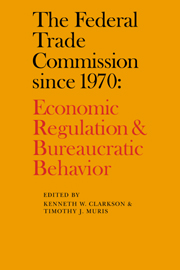Book contents
- Frontmatter
- Contents
- List of contributors
- Preface
- 1 Introduction
- Part I The institutional setting
- Introduction
- 2 Statutory powers
- 3 Legislative constraints
- 4 Judicial constraints
- 5 Executive constraints
- Part II Nature and consequence of FTC actions
- Part III Conclusions and reforms
- Notes
- Selected bibliography
- Index
5 - Executive constraints
Published online by Cambridge University Press: 05 November 2011
- Frontmatter
- Contents
- List of contributors
- Preface
- 1 Introduction
- Part I The institutional setting
- Introduction
- 2 Statutory powers
- 3 Legislative constraints
- 4 Judicial constraints
- 5 Executive constraints
- Part II Nature and consequence of FTC actions
- Part III Conclusions and reforms
- Notes
- Selected bibliography
- Index
Summary
This chapter considers constraints that arise from the White House, the Office of Management and Budget, the Civil Service Commission, the Justice Department, the General Services Administration, and other executive agencies. Like the congressional and judicial constraints, we consider those that arise from the executive branch as external to the Commission, although Commission employees may occasionally help shape these constraints.
The White House
White House involvement with the Federal Trade Commission consists largely of appointments, agency reorganization, scrutiny of major issues, and the budget process.
Appointments
Today, the appointment of the commissioners is an important constraint on the Commission. The power to appoint the chairman is particularly significant because of the influence he or she has within the Commission, as discussed in Chapter 15. From the mid-1930s until at least 1970, however, the Federal Trade Commission had the reputation as an agency “steeped in political patronage,” and as a “political dumping ground” where “positions were openly given because of personal connections and political patronage, with Southern Democrats receiving the lion's share.” Thus, presidents used their appointive power more to grant favors than to influence FTC activities. Beginning with Weinberger (see Chapter 1), this has changed. Congress also influences the appointments process, although more substantially when the president and the majority of the Congress come from different political parties. Thus, a White House advisor during the Nixon administration commented that “there were a number of instances where we did have to yield” in appointments.
- Type
- Chapter
- Information
- The Federal Trade Commission since 1970Economic Regulation and Bureaucratic Behavior, pp. 50 - 58Publisher: Cambridge University PressPrint publication year: 1981

